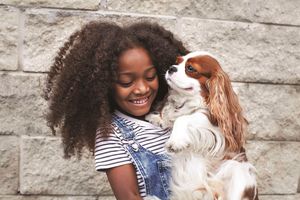
Research says pets offer comfort, calmness, reduce feelings of loneliness and reduce the negative emotions of life.
There is a silent rebellion happening among Kenyan women: The replacement of children with pets. This is a sharp contrast from the traditional norm where a woman was never considered complete if they don’t have a child.
Today, more women are making the conscious choice to forego motherhood, not because they can’t have children, but because they don’t want to. In place of babies, they are embracing cats and dogs.
In place of baby bottles, baby clothes and toys, they are investing in pet food, lint removers and feeding bowls. Their pets are loved, pampered, and, in many ways, treated like children.
My cats are my joy
*Jane Njeri is 43 years old, a university professor, and mother to nine cats. Growing up, Jane had always hoped that by age 25, she would be married then have three or four children. But that did not happen.
“This is a decision I made with time. The dating scene is not very friendly. After getting my university degree, I got into a few relationships that did not work out. Then I went back to school, got a Master's, then a PhD. Relationships were just not a priority.
They say you should have children when you are young because at that time you are still naïve and have not seen too much of life. When things didn’t go according to my plan, I decided to play the cards I had been dealt and find contentment in my life. I decided to be okay, and the quality of my life is fine,” Jane tells Nation Lifestyle, adding that she made this decision 15 years ago when she started teaching at the university.

When you show love to an animal, they respond with affection.
“When I started working with young people, I found them very complicated. I realised children can pretend a lot, are draining and demand a lot from you. I am a professor at the university, and I see that many parents do not like their children. During school breaks, they cannot wait for them to go back to school. Many parents don’t like spending time with their children because they consider them a nuisance. Many people had children because it was expected of them, not necessarily because they were excited about the idea of having children. Then they ended up having children who are wayward and struggle to manage them. Being a lecturer, I also see all the different sides of the children. The difference is, I get to send them home in the evening. I now feel content knowing that I don’t need children,” she says.
In a society where motherhood is often a non-negotiable milestone, choosing pets over children is a difficult conversation, and not everyone is ready to understand it. Jane has had to defend her lifestyle to her mother, who believes she is spending all her money on cats.
“My siblings are very tolerant and modern. They really don’t care whether or not I have children, but my mother is not happy. She often says things like, ‘I wish you loved me the way you love your cats’,” she says. “Right now I have nine cats. My mother thinks I spend all my money on them but I don’t. It is a joy for me to take care of them. When I am at work, I am always thinking, what are my cats going to take for supper?”
During the pandemic, Jane lived alone but never felt lonely. “I had my cats with me. They are therapeutic, you can talk to them, and they keep you occupied.” Jane says cats are easier to be with than dogs. ”When I come home, they are more than happy to receive me.” She spends an average of Sh10,000 monthly on them, and up to Sh30,000 when vet bills come in.
Jane has always loved animals. “I even wanted to be a veterinary surgeon after school; it’s just that I didn’t attain the requisite marks to pursue the course at university. Initially, I lived in a small house where I couldn’t really keep pets. Then, when I moved to a new place, I got enough space. If I had the power, I would get myself a hacienda where I’d keep horses and dogs.”

Women love, pamper their pets and treat them like children.
Jane says that when dating, she is keen to connect with someone who loves pets. “My cats are here to stay. If someone does not like animals, it is a red flag. If you cannot be kind to such a helpless creature, it says a lot about your character.” Does she have any regrets?
Not too much regret
“Every now and then I see people on the internet with their children and I feel something in my heart, but I cannot call it regret. It is not a feeling that overwhelms me or makes me lack sleep. It is fleeting and not crippling. However, if I get someone serious, I might consider having children. I will be open to giving birth or we can even adopt,” she says.
They are not just pets; they’re family
Eva Mutua, a lawyer, describes her three dogs, Max, Joe and Ruby, as her children. Max and Joe, who are Dachsunds, are going to be 15 years old in November, and Ruby, a wire-haired Jack Russell Terrier, is six years old. For Eva, pets became her chosen family after the loss of her mother five years ago.
“When my mother died, I was heartbroken. I had been living with her in my house. I got the dogs two years later. The dogs slipped into my life and really helped me grieve the death of my mother. I went to South Africa, and that is where I met Max and Joe,” she says.
“Initially, I didn’t want pets because I always thought that when they die, there would be too much grief for me to bear, but I really found happiness with my dogs.”
“I grew up in a farm and I was the last born. The age difference between me and my older sibling is 10 years, so this meant that when I was young, I was mostly alone. I would go out to the farm and play with the sheep and dogs. This is where my love for animals began.”
Single parenthood? Not an option
Eva prefers a planned life, so in high school, she came up with her own five-year plan for her life.
“I knew that I would finish high school when I was 17, finish my first degree when I am 22 then start practicing law. Then I said to myself that by the age of 28, I should be married and by 32, I should have finished having my children. But this didn’t happen.
I ended up going to India to do my first degree. Then when I came back, I realised the boyfriend I had in Kenya was not as serious. I ended up moving to the United Kingdom before coming back to Kenya. I have been single for a few years now, especially because of heartbreak and not getting the right person. Life moved on and I made peace with not having children,” Eva says. Being a single parent was not an option for her.
Now, Eva says she is happy and content with her decision not to have children.
“I don’t dislike children, but I realised that it is a lifelong commitment that I am not willing to make. I like other people’s children, but I can only hold them for a short while and I am done. It is important to have children when you are young. As you grow older, you realise that children are not toys that you can just get tired of and throw around,” she says.
Unlike Jane, who faced pressure to get children, Eva says that her mother was always supportive of her decision not to have a child. “People would tell my mum to compel me to have a child, but she would say, ‘Have you seen her? I will be left to take care of the child.’ So she knew that she shouldn’t pressure me to do something I was not willing to do.”

Pets are a source of emotional support and are custodians of love.
Eva now lives with three dogs. “They are completely like my children. I dress them up and take them for grooming. They are the most spoilt dogs in the neighbourhood.”
Before deciding never to have children, Eva says that she prayed. “I had a conversation with God asking that He allow me to get someone who is compatible, somebody with whom I can have children and if that doesn’t happen, I asked for strength to make peace with it. I didn’t want to be bitter about this decision.”
Why pets instead of children?

Stephen Karimi, a clinical psychologist.
Stephen Karimi, a clinical psychologist, says that the choice to have pets instead of children is often influenced by multiple factors, including emotional, economic, and even biological.
“You cannot replace the unique bond that a child brings, but you can get some company by bringing in a pet.
“Research says pets offer comfort, calmness, reduce feelings of loneliness and reduce the negative emotions of life. Pets are a source of emotional support and are custodians of love. When you show love to an animal, they respond with affection.”
However, he says that pets may not necessarily replace children.







